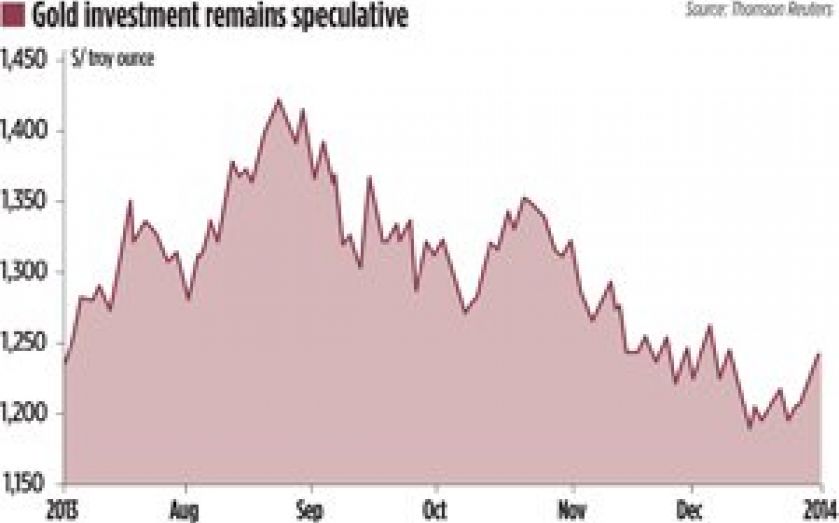Position your portfolio for a cautiously optimistic 2014

Large cap success, a stronger dollar, risky bonds, and volatility should be key themes
DESPITE troubles in emerging economies, 2013 proved to be a strong year for developed economy equity markets. And while remaining cautious about the coming months, investors also have reason to be optimistic about 2014. With economic data improving, corporate earnings better-than-expected, fair equity valuations, and low interest rates, the longer-term global recovery appears to be supported. And with events in Europe old news, investors can now look to corporate earnings, tapering discussions, and the growth story in China (despite recent disappointing data) to support global markets.
But first, it’s important to see the upcoming debates over the US debt ceiling and discussions over the Fed’s tapering for what they are – short-term noise. They do, however, represent an opportunity to make some good strategic investment decisions. In short, volatility and risk will likely increase in the near future. Return expectations, therefore, will need to be more realistic. Diversification and liquidity, however, should continue to be key considerations.
So what should investors keep front of mind in 2014?
DOLLAR EXPOSURE
Exposure to the US dollar will be a key driver of performance in 2014. We anticipate a stronger dollar as financial markets slowly improve, and estimate that fair value for sterling-dollar is $1.51 and euro-dollar is $1.27. The bulk of your investments, however, should always be in your base currency or at least hedged back to your base currency. Investments in non-base currencies are speculative in nature, and just add more risk to your portfolio.
LARGE CAPS
Large cap global equities, meanwhile, will trade higher. Remember that it is corporate earnings that drive share price appreciation, not geopolitical events. Over the long term, we are encouraged by fair valuations, good dividend yields, and better-than-expected earnings numbers.
We also remain positive on US equities. The US is still the engine of the world economy, significantly bigger than China, Japan and Europe. In China, growth prospects are improving, despite some recent poor figures, and exposure cannot really be avoided. Japan, meanwhile, will consolidate. We have also become more constructive on the UK and Europe, and expect both to outperform. Sector allocation and stock picking will be less important drivers of performance than these broad trends.
COMMODITIES
In 2014, it is likely that commodities and emerging markets will remain volatile – particularly oil, base metals, agriculture and broad-based emerging markets. Exposure to these commodities and markets is a leveraged play on global growth, which in our view is currently overly-optimistic. While investors are concerned about geopolitical risk, inflation and asset price bubbles, emerging market equity valuations have moderated and broad-based commodities have traded off their lows. Exposure can provide some portfolio diversification benefits, but it is still too early to reallocate in a meaningful way. We have, however, become more constructive on China.
BONDS
Bonds remain expensive but cannot be avoided. We recommend sticking to top quality government bonds like UK gilts, German bunds and US treasuries. High quality short-dated corporate bonds could be an alternative, and offer better returns than cash on deposit. But investors should avoid taking significant credit risk and interest rate risk, and should remember that chasing yield or income in the bond market is the worst thing possible.
GOLD
Gold remains overvalued. Anyone buying at current levels is still speculating, not investing. When market volatility is high, investors sell their gold, as it is seen as a provider of short-term liquidity or cash. When markets recover, investors again sell their gold and reallocate their money into riskier assets such as shares.
PROPERTY
Property is still the ultimate safe haven. Real estate performed well in 2013, although prime residential exposure is illiquid and now very expensive. We expect a broadly flat global property market this year, irrespective of equity markets. The easy money in real estate was made many years ago.
ALTERNATIVE INVESTMENT CLASSES
Limit your exposure to hedge funds, private equity and structured products. Exposure to hedge funds and private equity is an expensive leveraged play on the global recovery. Remember that you are taking much higher risks when putting your money into broadly illiquid “alternative investments”. Structured products remain expensive and make very little sense in terms of risk and price in a low interest rate environment.
INVESTMENT FEES
Total fees should be no more than 0.8 per cent of assets under management. This includes management fee charges, execution costs, custody fee charges and any retrocessions or rebates, which should be returned to you as the client. In 2014, as in any year, remember that fee leakage equates to wealth destruction over the long term.
In sum, global markets remain very uncertain, and investors should remember not to trade or speculate around geopolitical events. Stay focused on the fundamentals. Markets have a way of overreacting and swing from overly bullish to bearish in the blink of an eye. We remain positive on 2014, however, and see any short-term volatility as an opportunity to make some good long-term strategic investment decisions.
Yogi Dewan is chief executive of Hassium Asset Management.